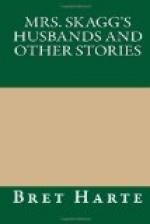As night shut down on the settlement, a few lights gleamed through the mist from the windows of cabins on either side of the highway now crossed and gullied by lawless streams and swept by marauding winds. Happily most of the population were gathered at Thompson’s store, clustered around a red-hot stove, at which they silently spat in some accepted sense of social communion that perhaps rendered conversation unnecessary. Indeed, most methods of diversion had long since been exhausted on Simpson’s Bar; high water had suspended the regular occupations on gulch and on river, and a consequent lack of money and whiskey had taken the zest from most illegitimate recreation. Even Mr. Hamlin was fain to leave the Bar with fifty dollars in his pocket,—the only amount actually realized of the large sums won by him in the successful exercise of his arduous profession. “Ef I was asked,” he remarked somewhat later,—“ef I was asked to pint out a purty little village where a retired sport as didn’t care for money could exercise hisself, frequent and lively, I’d say Simpson’s Bar; but for a young man with a large family depending on his exertions, it don’t pay.” As Mr. Hamlin’s family consisted mainly of female adults, this remark is quoted rather to show the breadth of his humor than the exact extent of his responsibilities.
Howbeit, the unconscious objects of this satire sat that evening in the listless apathy begotten of idleness and lack of excitement. Even the sudden splashing of hoofs before the door did not arouse them. Dick Bullen alone paused in the act of scraping out his pipe, and lifted his head, but no other one of the group indicated any interest in, or recognition of, the man who entered.
It was a figure familiar enough to the company, and known in Simpson’s Bar as “The Old Man.” A man of perhaps fifty years; grizzled and scant of hair, but still fresh and youthful of complexion. A face full of ready, but not very powerful sympathy, with a chameleon-like aptitude for taking on the shade and color of contiguous moods and feelings. He had evidently just left some hilarious companions, and did not at first notice the gravity of the group, but clapped the shoulder of the nearest man jocularly, and threw himself into a vacant chair.
“Jest heard the best thing out, boys! Ye know Smiley, over yar,—Jim Smiley,—funniest man in the Bar? Well, Jim was jest telling the richest yarn about—”
“Smiley’s a —— fool,” interrupted a gloomy voice.
“A particular —— skunk,” added another in sepulchral accents.
A silence followed these positive statements. The Old Man glanced quickly around the group. Then his face slowly changed. “That’s so,” he said reflectively, after a pause, “certingly a sort of a skunk and suthin of a fool. In course.” He was silent for a moment as in painful contemplation of the unsavoriness and folly of the unpopular Smiley. “Dismal weather, ain’t it?” he added, now fully embarked on the current of prevailing sentiment. “Mighty rough papers on the boys, and no show for money this season. And tomorrow’s Christmas.”




